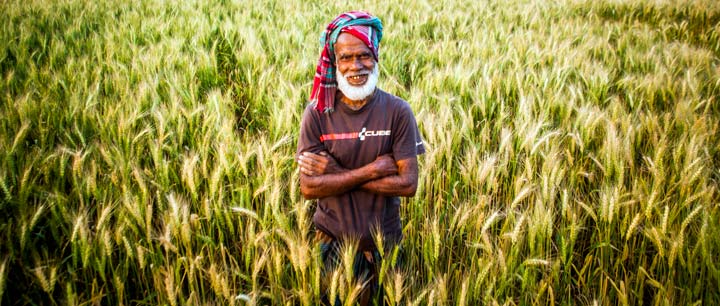
Thomas Lumpkin served as director general at CIMMYT from 2008 to 2015.
The history of wheat is the history of civilization. Over 10,000 years ago in the Fertile Crescent our ancestors ascended from an existence as hunter-gatherers and began tending and domesticating crops. Thus began wheat’s symbiotic relationship with the history of civilization and humankind’s responsibility as stewards of planet Earth.
Wheat is not only a major diet component but wheat-based products are the personification of cultural heritage and pride. Imagine Italians without pasta, North Africans without couscous, Indians without Chapattis or Chinese without noodles or steamed bread. It is time to pay homage to this grass, which was the basis for the development of modern civilizations and has done so much for the human race.
Wheat is the staple food of humankind, and its history is that of civilization. Yet today wheat is losing its crown. Many perceive wheat to be a food eaten and produced only by rich countries. Atkins, Davis (wheat belly) and other diets have convinced even more that wheat is bad for you and less wholesome than other crops. Although wheat remains an important crop, funding for wheat research has decreased significantly in recent years.
In spite of all these challenges, the demand for wheat is not dropping. Wheat is the staff of life for 1.2 billion poor people who live on less than US$ 2 a day; providing 20 to 50 percent of daily calories and 20 percent of protein. From South Asia through to Central Asia across the Middle East and on to North Africa, wheat is a staple food. Demand for wheat is not isolated to these traditional wheat-eating regions. Today African countries spend about US$ 12 billion annually to import some 40 million tons of wheat. What was once considered a minor crop for consumers in Sub-Saharan Africa, demand for wheat is now growing faster than for any other commodity and is now considered a strategic crop for food security by African leaders.
Perhaps what is most concerning are the predictions for the near future. Demand for wheat in the developing world is projected to increase 60 percent by 2050. India, the largest wheat-consuming country after China, has 17.5 percent of total world’s population and 20.6 percent of the world’s poor. If you look at a map showing the locations of recent food riots, it is almost identical to one showing where wheat provides more than one-third of a person’s daily calories. Households in developed countries spend less than 10 percent of their income on food supplies, in many countries, that percentage is much more. For example, in Pakistan and Egypt this figure is around 40 percent.
Interested in this subject? Find out more information here:
Friedman, T.L (2013) The scary hidden stressor. The New York Times. March 2, 2013
IPPC Report (2014) Climate Change 2013: The physical science basis
An Intergovernmental Panel on Climate Change (IPCC) report published earlier this year predicts that wheat will be the first of the main staple crops to be significantly affected by climate change, because of its sensitivity to heat and the fact that it is grown all over the world. Current projections predict that with every Celsius degree increase in temperature, wheat yields in semi-tropical areas could drop by 10 percent. Changes in weather may also lead to an increased risk in the severity of wheat diseases, which may cause severe losses in areas that were previously thought of as unimportant.
Recurrent food crises combined with climate change, depletion of natural resources and rising food prices are threatening the lives of millions of poor people who depend on wheat for both diet and livelihood. Demographers predict that by 2050 the earth’s population will peak at 9.6 billion. Developing countries, especially those in Africa and South Asia, are experiencing tremendous population growth. Based on current crop yields and food distribution methods, feeding nearly 10 billion people will not be trivial. Sustainably increasing wheat production will have a crucial impact on food security.
Wheat’s significant contribution to humankind is not yet over.
 Climate adaptation and mitigation
Climate adaptation and mitigation 
